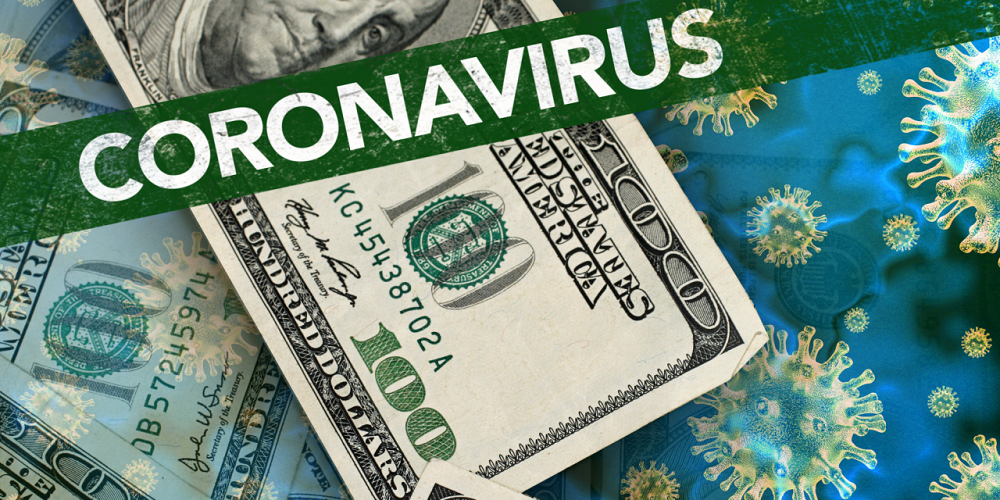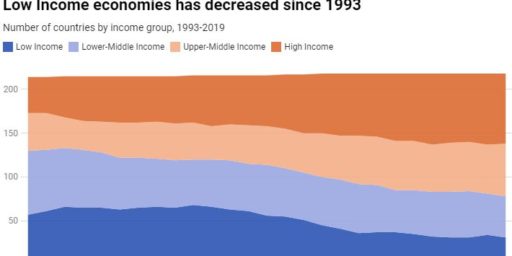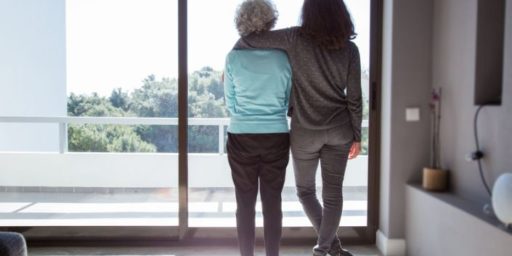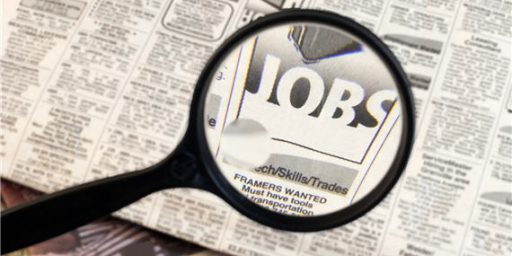The Inequality of Coronavirus
Social distancing is a lot easier when you're affluent.

Americans fear the coronavirus — but most aren’t changing their behavior,” Yahoo reports. The headline results are dismaying if unsurprising:
Seventy-four percent of Americans are afraid of accidentally spreading the virus to vulnerable people even if they are asymptomatic, according to a new survey from Harris Poll. But they’re not changing their daily patterns to actually mitigate risk to other people, according to the survey of 2,050 U.S. adults between March 14 and March 15.
Eighty-nine percent of Americans are still going to coffee shops and 58% have not changed how often they’re inviting people over, according to the Harris Poll survey respondents, whose age, sex, race/ethnicity, education, region, and household income were weighted to bring them into line with their actual proportions of the U.S. population.
Half of respondents have not altered their hygiene behavior with house guests (e.g., asking friends and family to wash their hands immediately upon entering). As recently as this past weekend, social distancing has become ubiquitous in talk but not practice.
As I noted over the weekend, while we’ve largely adopted social distancing in our household, we haven’t fully adopted the best practices recommended by experts. Our hard-wired social pressures makes it hard to rapidly change ingrained behaviors like shaking hands. And, with rapidly-changing recommendations from the top—avoid groups of 1000—no! 500—no! 10—people—is naturally causing a lag. And, of course, Fox News and other outlets have, until the last couple of days, been telling viewers that the whole thing is a sham.
But, as I sit here on my first day of what looks to be a very long period of telework, this is what really stood out from the report:
Adults with household income of at least $100,000 are three times more likely than families that make $50,000 or less to say they are working from home more often as a result of the coronavirus outbreak. Twenty-three percent of the affluent group say their employer has mandated a remote work policy compared to 13% of those in households making $50,000 or less.
Some employers are scrambling to implement policies to care for their employees amid such extenuating circumstances. Seventeen percent of adults whose households make $100,000 or more say their employer has explicitly offered to cover out-of-pocket healthcare costs for preventative care, (e.g., C19 testing, PCP visits), compared to six percent of those families making less than $50,000.
“This is a fluid situation. Some of us are caregivers, tutors, remote workers, daycare providers. And life has completely changed for many Americans,” Gerzema said. “There are big frustrations that their employers are lagging. Businesses have been caught flat footed. From the worker’s point of view, there hasn’t been a strong cadence of communication or demonstration of actual policies.”
My institution was too slow to shut down, in my judgment, because higher leadership still thinks of this as a force protection exercise rather than one in flattening the curve and protecting the wider community. But there has been a constant stream of communication, making it obvious that they understood the problem existed and were working on a solution.
More importantly, we’re extremely fortunate to not only be able to telecommute but continue to receive our full pay and rather generous health benefits. And my uniformed military colleagues and students have better benefits, still.
For us, then, we can go about our daily activities with comparatively little worry. Sure, we need to protect ourselves and family from the disease. And we have a responsibility to social distance for the sake of the less fortunate and the stability of the healthcare system. That all stinks. But we’re not worried about losing our jobs, much less paying for testing and care should we become symptomatic.






Correct.
I don’t know what else to say other than that it’s going to suck, and it’s going to suck more for a lot of people who aren’t as privileged.
But what’s the alternative? CostCo didn’t want to let their office staff work from home because of equity issues, and now one has died (lots of caveats on that story, including incubation period and timeline…. but it brings the stupidity of that first decision into sharp relief). I don’t think that “sharing the risk” was the right answer to the problem.
There are no good answers to the equity issues. We have to treat this as a public health crisis with social and economic equity concerns rather than a social and economic equity crisis with public health concerns.
Tip your delivery people well, and minimize contact to protect them. Push for paid sick days, and health care supports. Push for expanded unemployment for those whose jobs turn out not to be essential.
And take the social distancing and/or shelter in place seriously so screwing over the less fortunate at least wasn’t in vain.
Even for those of us who *really* know better.
I was introducing a high-ranking CMS official at a conference on Friday March 9th – just as everything was starting to blow up (enough that a major health system pulled their attendees out of the conference an hour later). While we had not shaken hands a bit earlier as we greeted each other (we’ve been attending the same conferences for years), we instinctively shook hand, in front of the whole conference, as she came up onto the stage. We both froze and than went “oops” – and made a show of using sanitizer. Automatic reflexes are automatic…
Everything is easier when you’re affluent. Most of the people in the front lines didn’t volunteer, they were drafted by circumstances. There’s a story we may have infections in 19 nursing homes in FL. There are doctors and nurses being exposed. But also a lot of medical aides and housekeeping and food service staff. With masks and other gear in short supply. And likely poorly paid with bad or no insurance and no sick time. Be nice to the people you deal with, try to keep your distance, and tip well. Don’t work to avoid getting it from them, act as though you have it, and don’t give it to them.
@Gustopher: … Well actually I think CostCo isn’t wrong. They have no way of having the working class staff “telecommute” since physical product is physical. And
Did the staff member die because the virus was caught at HQ or otherwise?
And if one is on the floor, how does it make one feel that higher-paid HQ office staff get to minimize risk but not you?
I don’t think the decision was stupid. It might not be the right decision but it wasn’t stupid.
This is so fast moving this survey is probably obsolete already. We were going to a wedding this coming Saturday (close friend of the family, our son is in wedding party). It went from full wedding last Sunday to pretty much cancellation (exchange of vows may still happen). First the church cancelled, then yesterday the reception hall cancelled. Most of the wedding party is very reluctant to participate. We feel so sorry for bride and groom especially since there are folks who came all the way from Germany and are now stuck here.
As for us, I had to bump up the home internet capability since everybody (me, wife, and two college kids) is online during the day now at home. Yes, life has changed but not that much and certainly not painfully.
The Yahoo story is about an old Harris survey. See the latest:
https://www.axios.com/americans-are-losing-sense-of-invincibility-toward-coronavirus-adb9b562-406f-4ae0-a56b-838876b7c449.html
An aside on the inequality aspect. Yesterday, through my local professional networking connections, I got a notice that the remaining Rite Aide Drug Stores in the area will most likely be hiring more sales associates due to increased need.
I know a number of service workers who are currently effected by closures. But I still paused a moment before forwarding this one as the nature of these jobs are the opposite of social distancing — not to mention that drug stores have the potential to be very near the front lines of the spread. That’s a lot of potential risk to take on to support oneself or your family.
People are slow changing their behavior. That’s why government shouldn’t recommend one not dine out or go to a coffee shop, but rather close down all restaurants, bars, etc.
Down here people are concerned, but not the way they were in the swine flu outbreak in 2009. Just about everything is open, though schools are due to close next week for the spring vacation, and that will be extended through April.
@gVOR08:
This.
Duh.
Even Trump admitted it yesterday the thing that most politicians know better than to say:
@Lounsbury:
You’re balancing some people’s lives with other people’s feelings.
You should try to reduce the inequity by reducing the risks for the folks on the floor, not by making others take risks they don’t have to.
The more people who have the virus in the community, the greater the risk to the people on the floor.
Having been very poor, and now being wealthy-adjacent I can confirm that absolutely everything is easier with money.
Changing behaviors is hard, and I agree @Kathy, that’s exactly why government intervention shutting things down is necessary.
Here in “Live free or die” NH, that very action has initiated a lawsuit.
@Jen:
Clearly, the state motto needs a revised conjunction. Either “and” or “but” would work.
@mattbernius: one interesting thing is that I’ve done much of my grocery shopping at the drug stores recently. They’re far less crowded than the grocery stores, and the shelves are more fully stocked (minus TP and thermometers).
Aside from white-collar workers being more likely to be allowed to work from home, there’s also having sufficient spare cash to stock up on food.
(This assumes that the company itself has its act together. One of my attorney friends is pulling her hair out because even though she–and everyone else at work–could be working from home–her company hasn’t yet given them permission to do so and the partners are doing nothing about the situation except dither about the situation.)
@Jen: It’s America. Everything generates a lawsuit. Reading the link, it doesn’t sound like that ones going anywhere.
I’m reminded of Lincoln. IIRC he had leaders of the Maryland secession movement arrested, without charges. They went to court for an order of habeus corpus. It got finally to the Supreme Court, which, as Lincoln expected, ordered them released. But by that time secession had been defeated and the rail lines from DC north were secure. Lincoln knew his action was illegal, but he did it anyway. Why? Because it was necessary. Leaders are supposed to lead. In a crisis do what needs to be done and sort out the legalities later.
So…yet another example of how economic inequality hurts many people…will the usual suspects finally see the light and agree that we need to do something about economic inequality? Doubtful…
Talk about inequality…
@An Interested Party:
If it’s an early tax rebate, then the cost to the government is very low. after all, when the rebate time comes after April, lots of people will get nothing.
Didn’t Bush the younger do the same thing early in his first term? As I recall, lots of people were pissed off when they found a smaller or non-existent tax rebate later in the year.